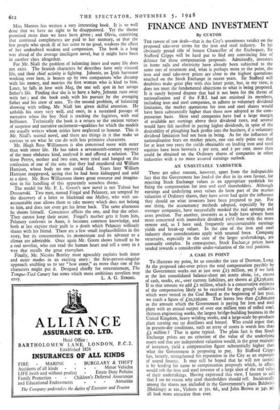FINANCE AND INVESTMENT
By CUSTOS
THE rawest of raw deals—that is the City's unanimous verdict on the proposed take-over terms for the iron and steel industry. In his obviously proud role of honest Chancellor of the Exchequer, Sir Stafford Cripps will be hard put to find any convincing line of defence for these compensation proposals. Admittedly, investors in home rails and electricity have already been subjected to the same sort of treatment and, what is perhaps more to the point, the iron and steel take-over prices are close to the highest quotations touched on the Stock Exchange in recent years. Sir Stafford will doubtless make great play with this latter point, but, in my view, it does not meet the fundamental objections to what is being proposed. It is surely beyond dispute that had it not been for the threat of nationalisation and if the F.B.I. had not enjoined its members, including iron and steel companies, to adhere to voluntary dividend limitation, the market .quotations for iron and steel shares would have been substantially higher than those now adopted as the com- pensation basis. Most steel companies have had a large margin of available net earnings above their dividend rates, and several would have felt justified in paying higher dividends, in spite of the desirability of ploughing back profits into the business, if a voluntary' dividend limitation had not been in being. As for the 'influence of nationalisation fears on market prices, one can only point out that for at least two years the yields obtainable on leading iron and steel equities have been between t per cent. and 2 per cent. more than could be obtained on the Ordinary shares of companies in other industries with a no more assured earnings outlook.
AN UNSUITABLE YARDSTICK There are other reasons, however, apart from the indisputable fact that the Government has loaded the dice in its own favour, for rejecting Stock Exchange values as an appropriate yardstick for fixing the compensation for iron and steel shareholders. Although earnings and underlying asset values do form part of the market valuation of Ordinary shares, they have never had quite the influence they should on what investors have been prepared to pay. For one thing, the accountancy methods adopted, especially by the stronger companies, have successfully masked the real earnings and asset position. For another, investors as a body have always, been more concerned with immediate dividend yield than with the more remote and, as I have said, frequently unascertainable earnings yields and break-up values. In the case of the iron and steel industry these considerations apply with unusual force. Company structures, especially in the case of the larger undertakings, are unusually complex. In consequence, Stock Exchange prices have tended towards a considerable under-valuation-of the real position.
' A CASE IN POINT To illustrate my point, let us consider the case of Dorman, Long. At the proposed take-over prices the total compensation payable by the Government works out at just over £13 million, yet if we look at the last consolidated balance-sheet net assets alone, i.e., excess of cash, stocks, etc., over current liabilities, are shown at £8,236,000. If to that amount we add £2 million, which is a conservative estimate of the compensation likely to be received for the group's collieries which were vested in the Coal Board at the beginning of last year, we reach a figure of £10,236,000. That leaves less than £2,800,000 as the amount which the Government is paying for iron and steel plant with an annual output of over one million tons of rolled steel, thirteen engineering works, the largest bridge-building business in the United Kingdom, heavy welding works, and a large-scale by-products plant turning out tar distillates and benzol. Who could argue that, in present-day conditions, slid' an array of assets is worth less than £3 million ? That is quite typical. The plain fact is that Stock Exchange prices are no criterion of the value of the underlying assets and that any independent valuation would, in the great majority of instances, yield a compensation figure substantially higher than what the Government is proposing to pay. Sir Stafford Cripps has, latterly, strengthened his reputation in the City as an exponent of sound finance. It may still be hoped that he will not tarnish it by lending his name to compensation proposals which, in effect, would rob the iron and steel investor of a large slice of the real value of their undertakings. Having expressed this view, I hasten to add that I see no reason why steel shareholders should sell. Incidentally among the shares not included in the Government's plans Baldwins (Holdings) at ins., Vickers at 32s. 6d., and John Brown at 345. 9d. all look more attractive than ever.










































 Previous page
Previous page